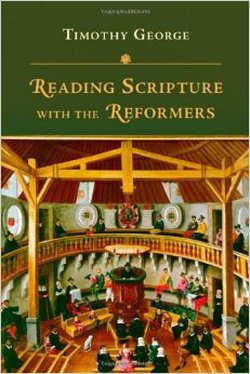
The book "shows how the key figures of the Reformation read and interpreted Scripture, and how their thought was shaped by what they read." The idea is that if we can understand how the reformers read the Bible we can understand how to rightly read and interpret it ourselves. For George, gleaning reformation hermeneutical principles is key as these principles are the last before the critical period of the modern era.
David Steinmetz is an invaluable figure for George. Steinmetz emphasized the importance of understanding the Reformation and it's hermeneutic within a medieval perspective. It is this pre-critical exegesis that will bring out the truth of the Biblical texts. Steinmetz's commitment to the pre-critical exegesis of the reformers leads him to develop his own 10 theses on Biblical interpretation (as presented in Biblical Interpretation in the Era of the Reform edited by Richard Muller and John Thompson). I have listed the 10 thesis below. The listing of the theses is not a blind agreement to them as much as it is a talking point to introduce the idea of reformation hermeneutics into the post-modern discussion of Biblical interpretation.
1. The meaning of a biblical text is not exhausted by the original intention of the author.
2. The most primitive layer of biblical tradition is not necessarily the most authoritative.
3. The importance of the Old Testament for the church is predicated upon the continuity of the people of God in history, a continuity which persists in spite of discontinuity between Israel and the church.
4. The Old Testament is the hermeneutical key which unlocks the meaning of the New Testament and apart from which it will be misunderstood.
5. The church and not human experience as such is the middle term between the Christian interpreter and the biblical text.
6. The gospel and not the law is the central message of the biblical text.
7. One cannot lose the tension between the gospel and the law without losing both gospel and law.
8. The church which is restricted in its preaching to the original intention of the author is a church which must reject the Old Testament as an exclusively Jewish book.
9. The church which is restricted in its preaching to the most primitive layer of biblical tradition as the most authoritative is a church which can no longer preach from the New Testament.
10. Knowledge of the exegetical tradition of the church is an indispensable aid for the interpretation of Scripture.
 RSS Feed
RSS Feed